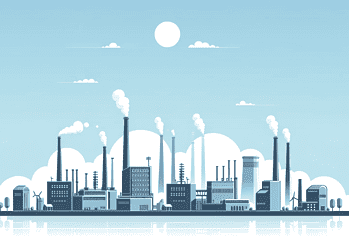Lacking in efficiency and stability, burgeoning economies might actually suffer if innovation comes too fast, or at too large a scale, a new paper reports. At the same time, highly mature economies put themselves at risk of collapse as they become too efficient and streamlined, it warns.

Moderation seems to be the skeleton key to every aspect of life — including policy and economics. Changes that overshoot on what a country’s economic systems can actually deliver risk backfiring completely, and developing economies seem to be especially at risk in this regard. That’s why for them, innovation can actually grind the economy to a halt when dealt in large heapings rather than manageable spoon-fulls. But even fully-fledged economies aren’t safe, warns a paper led by Charles Brummitt, a postdoctoral research fellow at the Center for the Management of Systemic Risk at Columbia University, New York.
Buffer up!
Drawing on their background in economy and economical system modeling, the authors developed a theoretical framework that models how disruptions propagate in a modern economy. They found that such disruptions are the effect of “poverty traps” which limit the ability of emerging economies to develop — especially when there’s a big push to do so. At the same time, large economies tend to slowly fall back into these traps as a direct consequence of the market’s tendency to promote efficiency via competition.
And the Achilles’ heel of all these systems is the supply chain.
The paper started from the observation that while poor economies have lower outputs, as well as shorter supply and production chains, they’re much more prone to disruptions than mature economies — and experience them more often. Stronger economies, by contrast, have robust supply chains and complex economies but “are not immune to disruptions,” either. Here, problems usually arise because “competition drives firms to build lean supply chains,” so a single hitch in the chain can cause “large aggregate losses” across the whole system.
The authors report that hiccups in the supply chain can spread “contagiously” throughout the whole economy. This way, even a tiny original disruption can end up leaving a deep mark in an economy through a cascade effect that propagates the damage with every step.
Too big to rise
For under-developed economies, disruptions can be traced back to a host of factors associated with immature industrial and economic systems, such as faulty machinery, power shortages, logistical issues associated with poor infrastructure, work absenteeism, and so on.
Faced with such constraints, agents naturally scale back on their operations. They roll-back on their technological base (no need for cutting edge computers when there’s no reliable power in the grid) or shorten logistical chains to mitigate the impact of infrastructure, for example, all of which translate into a scale-down of production — both in regards to the quantity and quality of goods produces.
The flip-side is that this constant scaling-down process means that disruption sources become chronic — if the economy is bad, there’s no money to invest in power or infrastructure. If production chains are kept short to avoid issues, there’s no reason (and economic means) for longer and more stable chains to develop.
In this context, when an economic or industrial actor tries to scale up too much, the rest of the economy simply can’t sustain it. The enterprise either fails or scales back down. The authors use this argument to point out that our current way of trying to help such systems develop actually dooms them to constant under-development cycle. The best way to go about it, they argue, is to promote incremental improvements in the sustainability and stability of an economy, not its scale or scope.
“The big technological push that for a long time was the standard policy recommendation for underdeveloped countries is not the solution”, says paper co-author and University of Bocconi’s Department of Decision Sciences Prof. Vega-Redondo.
“Pushing these economies beyond the functionality of their system makes them even more dysfunctional. The solution is to proceed by gradual increases in technological complexity”.
Too small to stand
In mature economies, it’s actually too much efficiency that causes problems. Companies are in constant competition, and over time one actor imposes itself on the market. The more market share in its particular field it gathers, the more it pushes competitors out of business — and this weakens supply chains. Any issue with that one company will impact others who depend on its product or service, no matter what field they operate it. In turn, companies that depend on these latter ones will be impacted, and so on.
“Once the economy develops, these buffers are considered redundant and shrink. Eventually, the flip side of the coin is that, by becoming too lean, an economy becomes also more fragile,” Vega-Redondo explains.
“This is something you can see in our modern developed economies – think, for example, about the consequences of the 2011 earthquake off Japan‘s Pacific coast. Disruptions that had a relatively limited geographical and productive scope ended up imposing a major burden on the overall Japanese operations, both in Japan itself and abroad”.
Overall, the team argues that increasing the resilience of these supply chain “buffers” helps eliminate disturbances and promote general system health. For example, such measures might include having several suppliers instead of one for key industrial commodities — how that goal is reached is up for us to decide.
The paper “Contagious disruptions and complexity traps in economic development” has been published in the preprint journal ArXiv.






